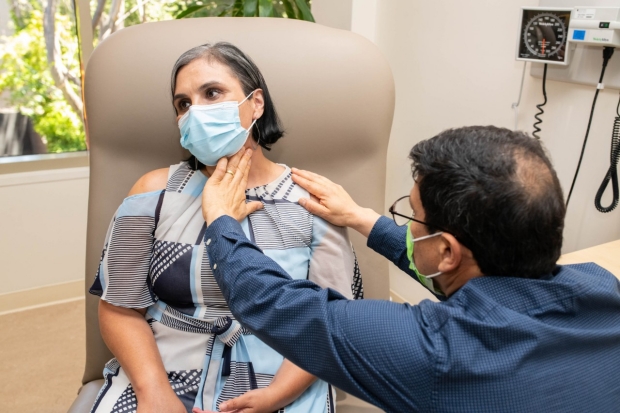
-By Pamela Cruz. Peninsula 360 Press [P360P]
With research showing that up to 30 percent of COVID-19 patients experience persistent symptoms, Stanford Health Care has been operating a Post Acute COVID-19 Syndrome (PACS) Clinic since May.
For about five months after contracting COVID-19, Rosie Flores lay on the couch in her Mountain View, California, home, feeling so fatigued that standing up was a struggle.
"I remember walking from the couch to my bed to grab a comforter and I was breathless," said Flores, 47, who tested positive for coronavirus in July 2020. "My arms felt like noodles. A phone conversation exhausted me. My life was just living on the couch."
Nearly a year later, that fatigue has finally improved somewhat. She returned to work part-time in December as a project coordinator at Stanford Health Care, and returned full-time in March, but the day-to-day work remains exhausting and she continues to struggle with other symptoms, such as memory impairment, hair loss and balance problems.
In the fall, Flores was diagnosed at the Stanford Health Care clinic with symptoms of post-viral COVID-19 or better known as prolonged COVID.
Unfortunately, so are many people like her. As coronavirus cases have declined across the country since last winter's peak, this newly described illness is estimated to affect up to 30 percent of recovering coronavirus patients.
That situation has drawn the attention of the media, the federal government and the medical community, raising concerns that the long-term public health impact of the disease could be overwhelming.
At Stanford, some doctors who have been treating patients with COVID-19 and researching COVID for a long time realized they needed a clinic specifically for patients like Flores.
"As the pandemic progressed, we began to see patients with all kinds of persistent symptoms after the initial COVID infection, such as fatigue, dizziness, cognitive dysfunction, mood symptoms, chest pain, shortness of breath, insomnia, loss of taste and smell, hair loss and sleep disturbances," said Linda Geng, M.D., clinical assistant professor of medicine, who co-directs the clinic at Stanford.
Persistent symptoms of COVID-19
Media stories about a large number of patients who recovered from COVID-19, but developed new and persistent symptoms, first appeared last summer.
The cause of prolonged COVID-19 remains unclear and the number of people who have it is unknown. It can persist for months and range from mild to disabling. There is no definitive laboratory test to diagnose it, and there are no standardized treatments. In many cases, patients wonder if they will ever get better, Stanford Medicine said.
In any case, he said, enough scientific evidence has accumulated to confirm that the problem is not only real but worrisome, according to the federal government. In December, Congress provided the National Institutes of Health (NIH) with $1.15 billion to study the long-term symptoms of COVID-19.
The NIH named the disease as a post-acute sequela of SARS-CoV-2 infection and launched an initiative to find treatments.
"We don't yet know the magnitude of the problem, but given the number of people of all ages who have been or will be infected with SARS-CoV-2, the coronavirus that causes COVID-19, the public health impact could be profound," Francis Collins, director of the NIH, said in an press release announcing the initiative.
In May, a study by Stanford Medicine epidemiologists found that 70 percent of hospitalized patients with COVID-19 had at least one symptom months later; another analysis found that even those with less severe cases of the virus, and who were never hospitalized, were experiencing prolonged COVID.
Stanford doctors and scientists continue to track symptoms and perform imaging as they search for causes and treatments.
The PACS Clinic is designed as a portal that connects patients with prolonged COVID to a multidisciplinary team of post-COVID experts, including pulmonologists, cardiologists and neurologists, based on symptoms.


